European Championships: Farah, Gemili and Sharp seeking gold
- Published
British stars ready for Euros
2014 European Athletics Championships |
Dates: 12-17 August. Location: Zurich, Switzerland |
Coverage: On BBC Two from 09:00 BST on 12 August; daily coverage, reports and interviews on BBC Sport website |
"How would you perform if this was the last time you would ever compete?"
This is the message that British captain Goldie Sayers will send her team-mates into battle with over the six days of these European Championships.
Sayers' team speech, made on Monday evening, was informed by the horrendous two years of injury she endured after London 2012 and designed to inspire a young squad to great deeds.
How might they respond? Which stars are likely to light up this athletics-obsessed city? And do these championships still matter, as they mattered of old?
How Britain might perform
Two years ago in Helsinki, Great Britain won only seven medals in total - the team's smallest haul in more than 30 years.
If that tally is not surpassed in Zurich it will be close to disastrous. Those 2012 championships were held just before the London Olympics, meaning only those athletes looking for qualifying times or a late sharpener travelled to Finland.
A more accurate gauge is Barcelona 2010, the last time Britain sent a full team to a European Championships.
In the Estadi Olimpic Stadium British athletes won 19 medals,, external including six golds. But three of the stars who triumphed on Montjuic - Jessica Ennis-Hill, Phillips Idowu and Dai Greene - are absent this time. Only Mo Farah of the individual champions is back to chase another title.
Britain's performance at the last six events | ||||
|---|---|---|---|---|
Year and location | Gold | Silver | Bronze | Total |
2012 - Helsinki, Finland | 4 | 2 | 1 | 7 |
2010 - Barcelona, Spain | 6 | 7 | 6 | 19 |
2006 - Gothenburg, Sweden | 1 | 5 | 5 | 11 |
2002 - Munich, Germany | 5 | 2 | 5 | 12 |
1998 - Budapest, Hungary | 9 | 4 | 3 | 16 |
1994 - Helsinki, Finland | 6 | 5 | 2 | 13 |
"I'm never going to set a specific target," says team performance director Neil Black. "But I'm absolutely certain we're going to do better than we did in Helsinki but not as well as we did in Barcelona.
"I'll never be specific because it distracts people from the actual performances, and the background to those performances. It sounds like a cop-out, but it's true.
"Every year is unique. This one is skewed by the Commonwealth Games, and the World Juniors, and the World Relays."
For Black, who took over the mantle of 2012 head coach Charles van Commenee without sharing quite the same responsibilities, these championships are an opportunity to show that the changes he is making are improving British athletics.
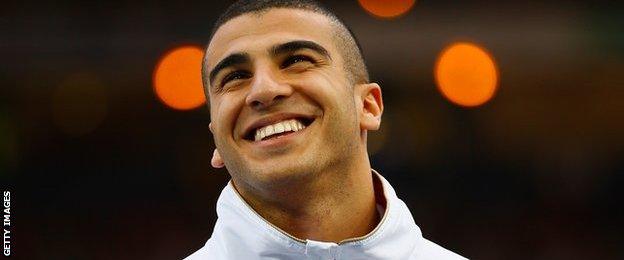
Adam Gemili, who won silver in the Commonwealth Games in the 100m, will be in the 200m in Zurich
Far less high-profile than the charismatic, divisive Van Commenee, Black has faced an arguably harder task: rebuilding a team for the Rio Olympics that can match the deeds of London. Is he happy with progress thus far?
"I am, but I'm a great realist. It has taken us a long time to reorganise ourselves.
"We probably used to be a little too arty, a little too much 'it'll be OK'. As opposed to, we still want the dream, but we need a framework.
"The level of professionalism and honestly has improved. And the sense of where we need to go has improved. But I'm very aware we're at early stages."
The Mo Show
Four years ago Farah made his big breakthrough in winning both 5,000m and 10,000m titles in Barcelona., external It was the start of a golden run that would take him through two World Championships and the spectacular successes of London 2012.
He should have nothing to prove. But after his most troubled year since that double success, that is rather how Zurich might feel.
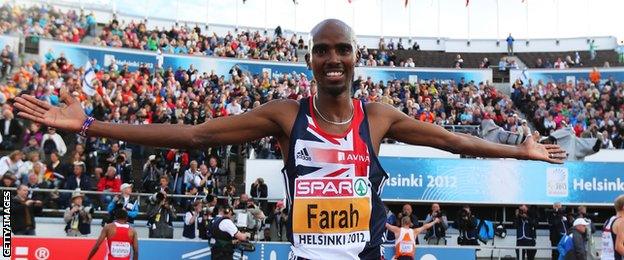
Mo Farah won gold at the European Championships two years ago but has had a troubled 2014 so far
Farah's much anticipated marathon debut in London last April ended with a disappointing if not entirely surprising eighth place.
Dogged by injury and abdominal pains he has not raced since, pulling out of the Commonwealth Games on the opening morning of competition.
At his best he should win double gold again. The unknown is how close to his best he might be.
"He's in good shape," insists Black. "He's very happy with how he feels. I know he's coming here to do his best for the British team.
"He doesn't have any concerns about his capacity to do that. The only people who should be worrying are the others on the start line."
The stand-out stars
For all the presence of Olympic long jump champion Greg Rutherford and twice World 400m champion Christine Ohuruogu, this British squad is as much about the emerging talent as the established.
There is Adam Gemili, fresh from his Commonwealth 100m silver in Glasgow, taking on reigning champion Christophe Lemaitre in his preferred event of 200m.
There is 17-year-old Morgan Lake, newly crowned World Junior heptathlon champion, competing here in the high jump.
There is 400m sensation Matthew Hudson-Smith, 19 years old and improving with every race at what is still an unfamiliar distance, 19-year-old 800m tyro Jess Judd and 20-year-old sprinter Jodie Williams, at last fulfilling all her rich junior potential and hunting a third personal best in two months.
"I think this team is one of the most exciting we've had," says Sayers.
"We've got some fantastic experience in Dwain Chambers and Jo Pavey, but also a layer not just here for experience but to do something. I made my debut aged 20 and was nowhere near as good as some of these guys."
Then there are those looking to push on from big performances in Glasgow.
Eilidh Child, 400m hurdles silver medallist, is the top-ranked European in her event this season; her Scottish team-mate Lynsey Sharp, who also won silver at the Commonwealths, has unfinished business of a different sort.
Two years ago in Helsinki Sharp initially won 800m silver behind Yelena Arzhakova, only for the Russian to later be stripped of her title for abnormalities in her biological passport.
Presented with her gold in March this year, Sharp was nonetheless denied the chance to run a lap of honour or stand atop the podium. This time she wants to do things properly.
The standard of competition
How good are the Europeans? Now that the championships are biennial rather than every four years, these are the edition with greater clout - out of Olympic year, the next step down from the world championships.
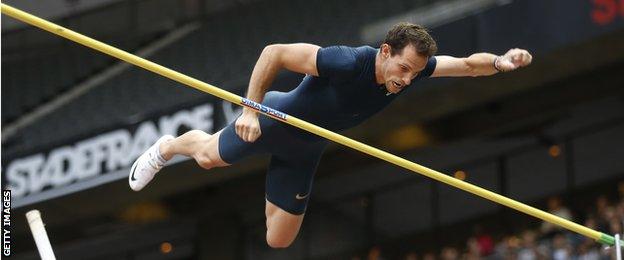
French pole vaulter Renaud Lavillenie, the current world record holder, will be competing in Switzerland
There is a rich history (Sebastian Coe, Daley Thompson, Sally Gunnell and Denise Lewis are all former champions) and there is a strong present.
In French pole vaulter Renaud Lavillenie there is a man who earlier this year broke one of the great enduring barriers in the sport, Sergey Bubka's 21-year-old record of 6.15m.
His compatriot Pascal Martinot-Lagarde is the breakthrough sprint hurdler of the season, going within 0.15 secs of Aries Merritt's world record this summer.
Brilliant Ukrainian Bohdan Bondarenko has already equalled Patrik Sjoberg's European high jump record of 2.42m this year and is now chasing Javier Sotomayor's 21-year world record of 2.45m.
For the Britons present, Black's message is dependent on age and experience.
"Despite the Commonwealth Games, this is the primary competition for athletes wearing British vest," says Black. "They are a really important championships in their own right.
"It's part of a journey. For some athletes they are the most critical thing for this year. For others it is just a stepping stone, another practice on a way to a bigger thing.
"We don't want to put too much pressure on some of our younger athletes. It's about an experience that supports their development."
The atmosphere and expectations
European Championships work best when staged in a city in love with the sport. In Zurich, home of the world's best one-day meet, the Weltklasse, they could be nowhere better.
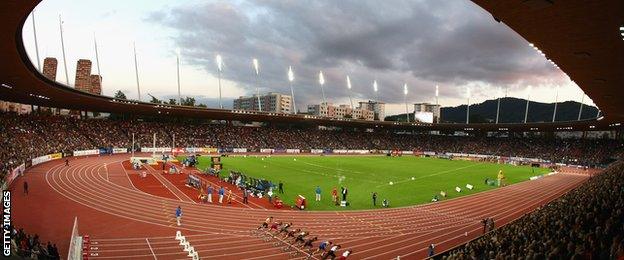
The Letzigrund Stadium in Zurich, Switzerland has hosted some memorable athletics events
Down the years many of the great world records have been set at the Letzigrund Stadium, from Seb Coe's 1500m mark in 1979 and mile record two years later to Haile Gebrselassie's 5000m in 1995, Wilson Kipketer's 1:41.24 800m in 1997 and Yelena Isinbayeva's 5.06m pole vault five years ago.
Such deeds have fostered a crowd that understands athletics like few others. This year too a track that was already considered fast has been given a £500,000 overhaul.
If the weather forecast for the next six days is unfavourable, much else is set fair.
- Published12 August 2014

- Published7 August 2014
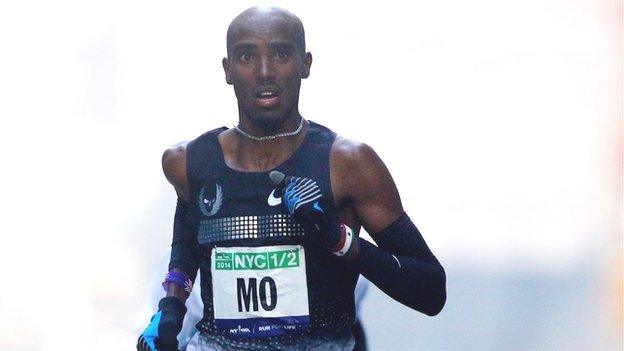
- Published29 July 2014
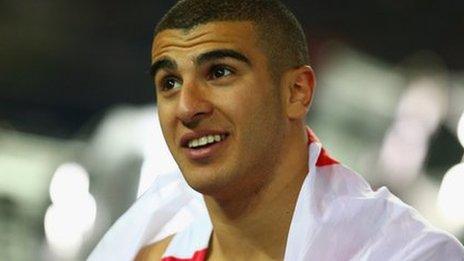
- Published6 August 2014
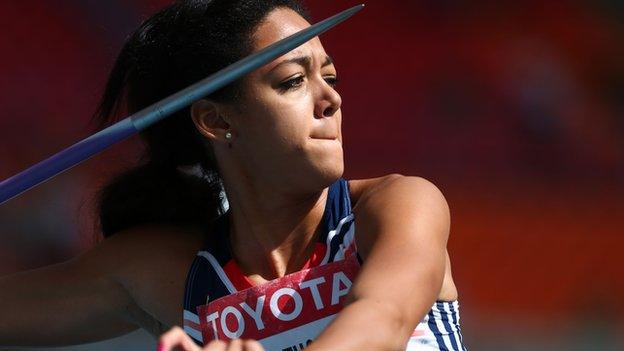
- Published28 July 2014
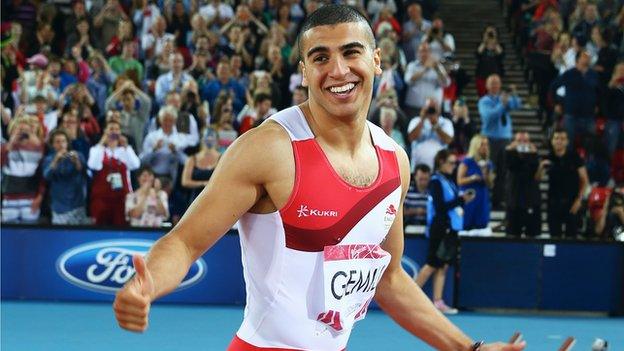
- Published1 August 2014
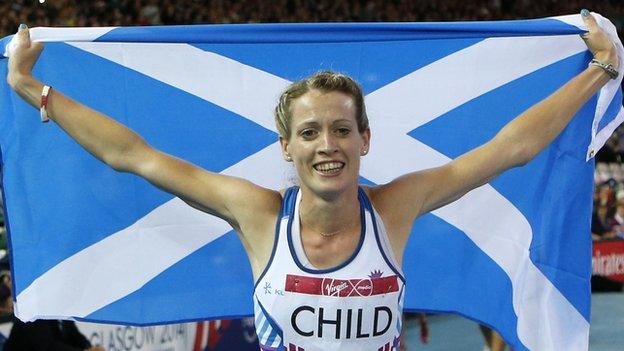
- Published10 September 2015

- Published8 February 2019
